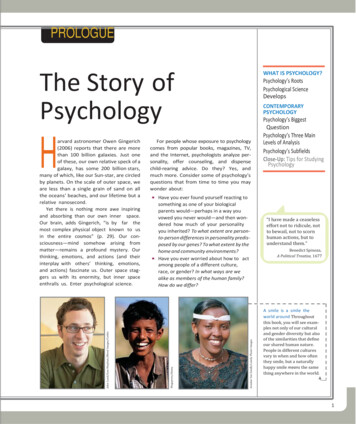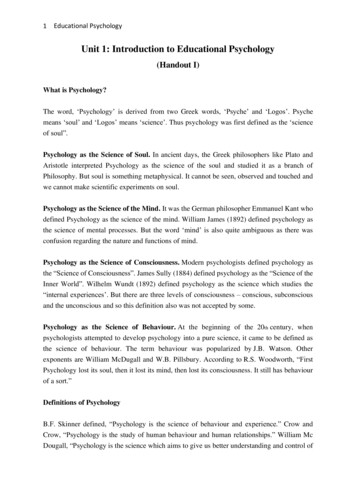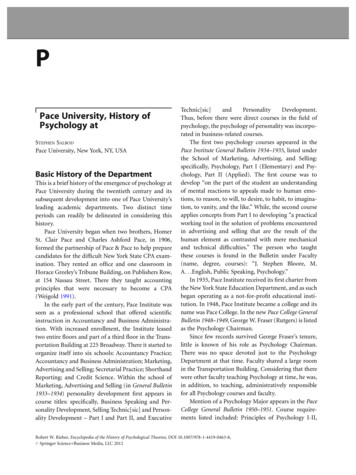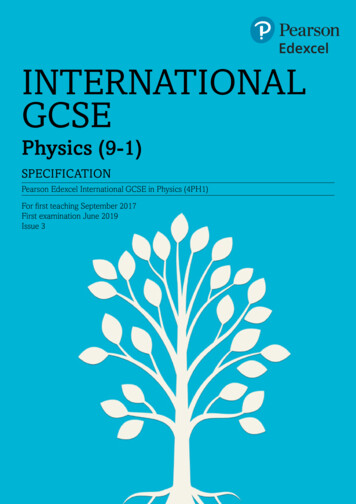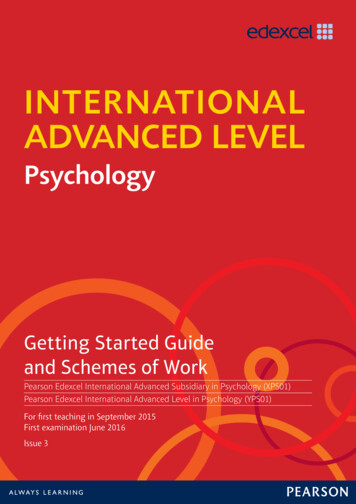
Transcription
A LevelPsychologySpecificationPearson Edexcel Level 3 Advanced GCE in Psychology (9PS0)First teaching from September 2015First certification from 2017Issue 2
PearsonEdexcel Level 3Advanced GCEin Psychology (9PS0)SpecificationFirst certification 2017Issue 2
Edexcel, BTEC and LCCI qualificationsEdexcel, BTEC and LCCI qualifications are awarded by Pearson, the UK’s largestawarding body offering academic and vocational qualifications that are globallyrecognised and benchmarked. For further information, please visit our qualificationswebsite at qualifications.pearson.com. Alternatively, you can get in touch with ususing the details on our contact us page at qualifications.pearson.com/contactusAbout PearsonPearson is the world's leading learning company, with 35,000 employees in morethan 70 countries working to help people of all ages to make measurable progressin their lives through learning. We put the learner at the centre of everything wedo, because wherever learning flourishes, so do people. Find out more about howwe can help you and your learners at qualifications.pearson.comThis specification is Issue 2. Key changes are sidelined. We will inform centres ofany changes to this issue. The latest issue can be found on the Pearson website:qualifications.pearson.comReferences to third party material made in this specification are made in good faith.Pearson does not endorse, approve or accept responsibility for the content ofmaterials, which may be subject to change, or any opinions expressed therein.(Material may include textbooks, journals, magazines and other publications andwebsites.)All information in this specification is correct at time of publication.Original origami artwork: Mark BolithoOrigami photography: Pearson Education Ltd/Naki KouyioumtzisISBN 978 1 446 94208 6All the material in this publication is copyright Pearson Education Limited 2016
Summary of Pearson Edexcel Level 3Advanced GCE in Psychology specificationIssue 2 changesSummary of changes made between previous issue and thiscurrent issueAmendments made to the ‘overview of assessments’ sections.Pagenumber1–3Amendment made to fifth bullet point for 1.5.1 in the ‘conducting thepractical research exercise’ section.8Amendment made to Section 1.6 ‘Practical issues in the design andimplementation of research’ bullet point.9Amendment made to culture and gender bullet point in Section 2.6.14Amendment made to 3.5.1 in the ‘conducting practical researchexercise’ section – last bullet point17Amendment made to culture and gender bullet point in Section 3.6.18Amendment made to the fourth bullet for 4.5.1 in the ‘conducting thepractical research exercise’ section.22Study date amended to 2000 in Section 5.3.2.26Last sentence removed from 6.5.1.32Amendment made to the bullet points in section 6.5 ‘suitable examples’section.32Amendment made to section 8.3.4.40Amendments made to Assessment summary information for Paper 1 inSections A–D and Paper 2 Section A and Section B (p. 47) and forPaper 3 Sections A and B (p.48).47–48Synoptic assessment about Paper 3 been amended.54Spearman’s rank critical values have been updated.71Chi-squared distribution formula – statement at the bottom changed to‘The calculated value must be equal to or exceed the critical value inthis table for significance to be shown.’72Critical values for the Mann-Whitney U test have been updated.73–74If you need further information on these changes or what they mean, contact us via ourwebsite at: tml.
From Pearson’s Expert Panel for World Class Qualifications“ The reform of the qualifications system in England is a profoundly importantchange to the education system. Teachers need to know that the new qualificationswill assist them in helping their learners make progress in their lives.When these changes were first proposed we were approached by Pearson to join an‘Expert Panel’ that would advise them on the development of the new qualifications.We were chosen, either because of our expertise in the UK education system, orbecause of our experience in reforming qualifications in other systems around theworld as diverse as Singapore, Hong Kong, Australia and a number of countriesacross Europe.We have guided Pearson through what we judge to be a rigorous qualificationdevelopment process that has included: Extensive international comparability of subject content against the highestperforming jurisdictions in the world Benchmarking assessments against UK and overseas providers to ensure thatthey are at the right level of demand Establishing External Subject Advisory Groups, drawing on independent subjectspecific expertise to challenge and validate our qualifications Subjecting the final qualifications to scrutiny against the DfE content and Ofqualaccreditation criteria in advance of submission.Importantly, we have worked to ensure that the content and learning is futureoriented. The design has been guided by what is called an ‘Efficacy Framework’,meaning learner outcomes have been at the heart of this development throughout.We understand that ultimately it is excellent teaching that is the key factor to alearner’s success in education. As a result of our work as a panel we are confidentthat we have supported the development of qualifications that are outstanding fortheir coherence, thoroughness and attention to detail and can be regarded asrepresenting world-class best practice.”Sir Michael Barber (Chair)Professor Lee Sing KongChief Education Advisor, Pearson plcDirector, National Institute ofEducation, SingaporeBahram BekhradniaProfessor Jonathan OsbornePresident, Higher Education Policy InstituteStanford UniversityDame Sally CoatesProfessor Dr Ursula RenoldPrincipal, Burlington Danes AcademyFederal Institute of Technology,SwitzerlandProfessor Robin ConinghamProfessor Bob SchwartzPro-Vice Chancellor, University of DurhamHarvard Graduate School of EducationDr Peter HillFormer Chief Executive ACARA
IntroductionThe Pearson Edexcel Level 3 Advanced GCE in Psychology is designed for use inschools and colleges. It is part of a suite of GCE qualifications offered by Pearson.Purpose of the specificationThis specification sets out: the objectives of the qualification any other qualification that a student must have completed before taking thequalification any prior knowledge and skills that the student is required to have before takingthe qualification any other requirements that a student must have satisfied before they will beassessed or before the qualification will be awarded the knowledge and understanding that will be assessed as part of thequalification the method of assessment and any associated requirements relating to it the criteria against which a student’s level of attainment will be measured(such as assessment criteria).
RationaleThe Pearson Edexcel Level 3 Advanced GCE in Psychology meets the followingpurposes, which fulfil those defined by the Office of Qualifications and ExaminationsRegulation (Ofqual) for GCE qualifications in their GCE Qualification LevelConditions and Requirements document, published in April 2014.The purposes of this qualification are to: define and assess achievement of the knowledge, skills and understanding thatwill be needed by students planning to progress to undergraduate study at a UKhigher education establishment, particularly (although not only) in the samesubject area, for example higher education qualifications such as psychologydegrees and further education courses such as BTEC Higher Nationals set out a robust and internationally comparable post-16 academic course ofstudy to develop that knowledge, skills and understanding enable UK universities to accurately identify the level of attainment of students provide a basis for school and college accountability measures at age 18 provide a benchmark of academic ability for employers.Qualification aims and objectivesThe aims and objectives of the Pearson Edexcel Level 3 Advanced GCE inPsychology are to enable students to: develop essential knowledge and understanding of different areas of the subjectand how they relate to each other develop and demonstrate a deep appreciation of the skills, knowledge andunderstanding of scientific methods develop competence and confidence in a variety of practical, mathematical andproblem-solving skills develop their interest in and enthusiasm for the subject, including developing aninterest in further study and careers associated with the subject appreciate how society makes decisions about scientific issues and how thesciences contribute to the success of the economy and society.
The context for the development of this qualificationAll our qualifications are designed to meet our World Class Qualification Principles[1]and our ambition to put the student at the heart of everything we do.We have developed and designed this qualification by: reviewing other curricula and qualifications to ensure that it is comparable withthose taken in high-performing jurisdictions overseas consulting with key stakeholders on content and assessment, including learnedbodies, subject associations, higher-education academics, teachers andemployers to ensure this qualification is suitable for a UK context reviewing the legacy qualification and building on its positive attributes.This qualification has also been developed to meet criteria stipulated by Ofqual intheir documents GCE Qualification Level Conditions and Requirements and GCE ASand A level regulatory requirements for biology, chemistry, physics and psychology,published by the Department for Education (DfE) in April 2014.[1]Pearson’s World Class Qualification principles ensure that our qualifications are: demanding, through internationally benchmarked standards, encouraging deeplearning and measuring higher-order skills rigorous, through setting and maintaining standards over time, developingreliable and valid assessment tasks and processes, and generating confidence inend users of the knowledge, skills and competencies of certified students inclusive, through conceptualising learning as continuous, recognising thatstudents develop at different rates and have different learning needs, andfocusing on progression empowering, through promoting the development of transferable skills,see Appendix 1.
ContentsQualification at a glanceAssessment Objectives and weightingsKnowledge, skills and picTopic1:2:3:4:5:6:7:8:9:Social psychologyCognitive psychologyBiological psychologyLearning theoriesClinical psychologyCriminological psychologyChild psychologyHealth psychologyPsychological skillsAssessment1456101519242934394347Assessment summaryAssessment Objectives and weightingsBreakdown of Assessment ObjectivesEntry and assessment information47495051Student entry51Discount code and performance tables51Access arrangements, reasonable adjustments and specialconsideration52Malpractice53Equality Act 2010 and Pearson equality policy54Synoptic assessment54Awarding and reporting55Language of assessment55Other informationStudent recruitmentPrior learning and other endixAppendixAppendix1:2:3:4:5:6:Transferable skillsLevel 3 Extended Project qualificationMathematical skillsFormulae and statistical tablesCodesTaxonomy (command words)57575757616367717779
Qualification at a glanceThe Pearson Edexcel Level 3 Advanced GCE in Psychology is structured into ninetopic areas. Topics 1–4 are compulsory and focus on the areas that have laid thefoundations of modern psychological understanding. Topics 5–8 focus on how ourunderstanding of psychology is applied today. Topic 5 is compulsory. One topicfrom 6, 7 or 8 must be studied. Finally, Topic 9 summarises the psychological skillsand research methods covered in the qualification.This qualification consists of three externally examined papers.Students must complete all assessment in May/June in any single year.Paper 1: Foundations in psychology Externally assessed Availability: May/June First assessment: 2017*Paper code: 9PS0/0135% of thetotalqualificationOverview of content Topic 1: Social psychology Topic 2: Cognitive psychology Topic 3: Biological psychology Topic 4: Learning theoriesOverview of assessment Written examination. Students must answer all questions from five sections. Sections A–D total 70 marks and comprise mixed question types, includingstimulus and data response, short-answer and extended response questionsand cover the topic areas as follows:Section A: Social psychologySection B: Cognitive psychologySection C: Biological psychologySection D: Learning theories Section E: Issues and debates has 20 marks and comprises two extendedresponse questions, covering the topic area of issues and debates inpsychology. The assessment is 2 hours long. The assessment consists of 90 marks. The formulae and statistical tables given in Appendix 4: Formulae andstatistical tables will also be given in the paper. Calculators may be used in the examination.*See Appendix 5: Codes for a description of this code and all other codes relevantto this qualification.Pearson Edexcel Level 3 Advanced GCE in PsychologySpecification – Issue 2 – November 2016 Pearson Education Limited 20161
Paper 2: Applications of psychology Externally assessed Availability: May/June First assessment: 2017*Paper code: 9PS0/0235% of thetotalqualificationOverview of contentMandatory content Topic 5: Clinical psychologyOptional topics (students must study one) Topic 6: Criminological psychology Topic 7: Child psychology Topic 8: Health psychologyOverview of assessment Written examination. The paper is composed of two sections. Students must answer all questionsfrom Section A and all questions from a choice of three optional topic areas inSection B. Section A has 54 marks and comprises of mixed question types, includingdata and stimulus response, short-answer and extended response questionswith a 20-mark response covering the topic area of clinical psychology. Section B presents students with a choice of one from three optional topicareas – Criminological psychology, Child psychology or Health psychology.Each section totals 36 marks and comprises mixed question types, includingstimulus and data response, short-answer and extended response questions. The assessment is 2 hours long. The assessment consists of 90 marks. The formulae and statistical tables given in Appendix 4: Formulae andstatistical tables will also be given in the paper. Calculators may be used in the examination.*See Appendix 5: Codes for a description of this code and all other codes relevantto this qualification.2Pearson Edexcel Level 3 Advanced GCE in PsychologySpecification – Issue 2 – November 2016 Pearson Education Limited 2016
Paper 3: Psychological skills Externally assessed Availability: May/June First assessment: 2017*Paper code: 9PS0/0330% of thetotalqualificationOverview of contentTopic 9: Psychological skills: Methods Synoptic review of studies Issues and debates.Overview of assessment Written examination. Students must answer all questions from three sections. Section A has 24 marks and comprises mixed question types, includingstimulus and data response and short-answer questions, covering the topicarea of research methods. Section B has 24 marks and comprises mixed question types, includingstimulus and data response and short-answer questions based on psychologicalstudies and one extended response questions based on classic studies given inTopics 1-5. Section C has 32 marks and comprises two extended response questions,covering the topic area of issues and debates in psychology. The assessment is 2 hours long. The assessment consists of 80 marks. The formulae and statistical tables given in Appendix 4: Formulae andstatistical tables will also be given in the paper. Calculators may be used in the examination.*See Appendix 5: Codes for a description of this code and all other codes relevantto this qualification.Pearson Edexcel Level 3 Advanced GCE in PsychologySpecification – Issue 2 – November 2016 Pearson Education Limited 20163
Assessment Objectives and weightingsStudents must:% inGCEAO1Demonstrate knowledge and understanding of scientific ideas,processes, techniques and procedures30-35%AO2Apply knowledge and understanding of scientific ideas,processes, techniques and procedures:30-35%AO3 in a theoretical context in a practical context when handling qualitative data when handling quantitative dataAnalyse, interpret and evaluate scientific information, ideasand evidence, including in relation to issues, to: make judgements and reach conclusions develop and refine practical design and proceduresTotal435-40%100%Pearson Edexcel Level 3 Advanced GCE in PsychologySpecification – Issue 2 – November 2016 Pearson Education Limited 2016
Knowledge, skills and understandingContent overviewStudents should know, understand, apply, critically analyseand evaluate the following content – performing proceduresand making connections where appropriate.This qualification is composed of nine topics. ForTopics 1–4, content in the What students need to learncolumn in bold will be assessed for this qualification onlybut will not be assessed as part of the Advanced SubsidiaryGCE qualification.Content indicated with an ‘e.g.’ is intended to furtherillustrate core material and is indicative of content that maybe assessed. Additional examples not stated in thespecification may also be assessed.There are opportunities for students to developmathematical skills throughout the content. They arerequired to apply the skills to relevant psychologicalcontexts. Please see Appendix 3: Mathematical skills forfurther information.Assessment overviewStudents will be assessed through three examinationpapers, which focus on specific topics in the qualification.Paper 3 is by nature synoptic, however extended writingquestions in papers 1 and 2 may ask students to draw ontheir knowledge from other topics addressed in the paperconcerned.The formulae and statistical tables given in Appendix 4:Formulae and statistical tables will also be given in thepaper.Calculators may be used in the examination.Students may be required to respond to stimulus materialusing psychological concepts, theories and research fromacross topic areas.Students may be asked to consider issues of validity,reliability, credibility, generalisability, objectivity andsubjectivity in their evaluation of studies and theories.Students should be able to define any terms given in thespecification.Relevant psychological skills are contextualised in eachtopic area. In addition, they have been drawn together inTopic 9 in order to ensure that all content has beencovered.Pearson Edexcel Level 3 Advanced GCE in PsychologySpecification – Issue 2 – November 2016 Pearson Education Limited 20165
Topic 1: Social psychologyTopic overviewStudents must show understanding that social psychology isabout aspects of human behaviour that involve theindividual’s relationship to other persons, groups andsociety, including cultural influences on behaviour.Individual differences and developmental psychology mustbe considered when learning about obedience, prejudice,personality and cultural influences on social behaviour.Subject contentWhat students need to learn:1.1 ContentObedience1.1.1Theories of obedience, including agency theory andsocial impact theory.1.1.2Research into obedience, including Milgram’sresearch into obedience and three of his variationstudies: Rundown Office Block (Experiment 10),Telephonic instructions (Experiment 7), Ordinaryman gives orders (Experiment 13) as theydemonstrate situational factors that encouragedissent.1.1.3Factors affecting obedience and dissent/resistanceto obedience, including individual differences(personality and gender), situation and culture.Prejudice1.1.4Explanations and research into prejudice, includingsocial identity theory (Tajfel and Turner, 1979,1986) and realistic conflict theory (Sherif, 1966).1.1.5Factors affecting prejudice (and discrimination),including individual differences (personality),situation and culture.1.1.6Individual differences in obedience/prejudice1.1.76 Obedience is affected by personality. Prejudice can have an explanation linked topersonality.Developmental psychology in obedience/prejudice Obedience can be affected by gender andculture, which come from environmental effects. Prejudice can be affected by culture, whichcomes from environmental effects.Pearson Edexcel Level 3 Advanced GCE in PsychologySpecification – Issue 2 – November 2016 Pearson Education Limited 2016
Subject contentWhat students need to learn:1.2 MethodsSelf-reporting data1.2.1Designing and conducting questionnaires andinterviews, considering researcher effects.1.2.2Unstructured, semi-structured and structuredinterviews, open, closed (including ranked scale)questions.1.2.3Alternate hypotheses.Sample selection and techniques1.2.4Random, stratified, volunteer and opportunitytechniques.Qualitative and quantitative data1.2.5Analysis of quantitative data: calculating measuresof central tendency, frequency tables, graphicalpresentation using a bar chart, measures ofdispersion (range and standard deviation).1.2.6Analysis of qualitative data using thematic analysis.Ethical guidelines1.2.71.3 StudiesBritish Psychological Society (BPS) code of ethicsand conduct (2009) including risk managementwhen carrying out research in psychology.Classic study1.3.1Sherif et al. (1954/1961) Intergroup conflict andcooperation: The Robbers Cave Experiment.One contemporary study from the following:1.4 Key questions1.3.2Burger (2009) Replicating Milgram: Would peoplestill obey today?1.3.3Reicher and Haslam (2006) Rethinking thepsychology of tyranny.1.3.4Cohrs et al. (2012) Individual differences inideological attitudes and prejudice: evidence frompeer report data.1.4.1One key question of relevance to today’s society,discussed as a contemporary issue for society ratherthan an academic argument.1.4.2Concepts, theories and/or research (as appropriateto the chosen key question) drawn from socialpsychology as used in this qualification.Suitable examples How can knowledge of social psychology be used toreduce prejudice in situations such as crowd behaviouror rioting? How can social psychology be used to explain heroism?Pearson Edexcel Level 3 Advanced GCE in PsychologySpecification – Issue 2 – November 2016 Pearson Education Limited 20167
Subject contentWhat students need to learn:1.5 Practicalinvestigation1.5.1One practical research exercise to gather datarelevant to topics covered in social psychology. Thispractical research exercise must adhere to ethicalprinciples in both content and intention.In conducting the practical research exercise, studentsmust: design and conduct a questionnaire to gather bothqualitative and quantitative data to look for a differencein the data consider questionnaire construction, sampling decisionsand ethical issues collect and present an analysis of quantitative data usingmeasures of central tendency, measures of dispersion,(including range and standard deviation as appropriate),bar graph and frequency table collect and present an analysis of qualitative data usingthematic analysis consider strengths and weaknesses of the questionnaireand possible improvements write up the procedure, results and discussion section ofa report.Suitable examples8 A questionnaire to see if males or females perceivethemselves to be more obedient. An investigation into in-group favouritism.Pearson Edexcel Level 3 Advanced GCE in PsychologySpecification – Issue 2 – November 2016 Pearson Education Limited 2016
Subject contentWhat students need to learn:1.6 Issues anddebatesExamples of issues and debates in social psychology: Ethics (e.g. when researching obedience and prejudice,and also implications of findings in both areas). Practical issues in the design and implementationof research (e.g. designing questionnaires andinterviews and social desirability). Reductionism (e.g. the risk of reductionism whendrawing conclusions from social data). Comparisons between ways of explainingbehaviour using different themes (e.g. the twotheories of prejudice: social identity and realisticconflict). Psychology as a science (e.g. social desirability inquestionnaires; issues of validity in questionnaires). Culture and gender (e.g. whether prejudice andobedience are influenced by cultural factors or accordingto gender). Nature-nurture (e.g. the role of personality inobedience compared with the role of the situation). An understanding of how psychologicalunderstanding has developed over time (e.g. ifusing Burger's work replicating Milgram and comparingwith Milgram's work; or looking at Tajfel's ideas and acontemporary study). Issues of social control (e.g. reducing prejudice; orhow people obey someone in authority/uniform). The use of psychological knowledge in society(e.g. reducing conflict in society) Issues related to socially-sensitive research(e.g. racism or cultural differences in social psychology).Pearson Edexcel Level 3 Advanced GCE in PsychologySpecification – Issue 2 – November 2016 Pearson Education Limited 20169
Topic 2: Cognitive psychologyTopic overviewStudents must show understanding that cognitivepsychology is about the role of cognition/cognitiveprocesses in human behaviour. Processes includeperception, memory, selective attention, language andproblem solving. The cognitive topic area draws on thelikeness of cognitive processing to computer processing.Individual differences and developmental psychology mustbe considered when learning about memory differences,memory deficits and how this develops as the brain ages.Subject contentWhat students need to learn:2.1 ContentMemory2.1.1The working memory model (Baddeley and Hitch,1974).2.1.2The multi-store model of memory (Atkinson andShiffrin, 1968), including short- and long-termmemory, and ideas about information processing,encoding, storage and retrieval, capacity andduration.2.1.3Explanation of long-term memory – episodic andsemantic memory (Tulving, 1972).2.1.4Reconstructive memory (Bartlett, 1932) includingschema theory.2.1.5Individual differences in memory2.1.610 Memory can be affected by individual differencesin processing speed or by schemas that guidethe reconstructive nature of memory. Autobiographical memory is by nature individual.Developmental psychology in memory, including atleast one of these: Sebastián and Hernández-Gil (2012) discussdevelopmental issues in memory spandevelopment, which is low at 5-years old, thendevelops as memory develops, up to 17-yearsold. Dyslexia affects children's memory, span andworking memory which can affect their learning. The impact of Alzheimer's on older people andthe effects on their memory.Pearson Edexcel Level 3 Advanced GCE in PsychologySpecification – Issue 2 – November 2016 Pearson Education Limited 2016
Subject contentWhat students need to learn:2.2 MethodsExperiments2.2.1Designing and conducting experiments, includingfield and laboratory experiments.2.2.2Independent and dependent variables.2.2.3Experimental and null hypotheses.2.2.4Directional (one-tailed) and non-directional (twotailed) tests and hypotheses.2.2.5Experimental and research designs: repeatedmeasures, independent groups and matched pairs.2.2.6Operationalisation of variables, extraneous variablesand confounding variables.2.2.7Counterbalancing, randomisation and order effects.2.2.8Situational and participant variables.2.2.9Objectivity, reliability and validity (internal,predictive and ecological).2.2.10 Experimenter effects, demand characteristics andcontrol issues.2.2.11 Quantitative data analysis Analysis of quantitative data: calculate measuresof central tendency, frequency tables, measuresof dispersion (range and standard deviation),percentages. Graphical presentation of data (bar graph,histogram).2.2.12 Decision making and interpretation of inferentialstatistics Non-parametric test of difference:Mann-Whitney U and Wilcoxon. Probability and levels of significance(p .10 p .05 p .01). Observed and critical values, use of criticalvalue tables and sense checking of data. One- or two-tailed regarding inferential testing. Type I and type II errors. Normal and skewed distribution.2.2.13 Case study of brain-damaged patients, includingHenry Molaison (HM) and the use of qualitativedata, including strengths and weaknesses of thecase study.Pearson Edexcel Level 3 Advanced GCE in PsychologySpecification – Issue 2 – November 2016 Pearson Education Limited 201611
Subject contentWhat students need to learn:2.3 StudiesClassic study2.3.1Baddeley (1966b) Working memory model: Theinfluence of acoustic and semantic similarity onlong-term memory for word sequences.One contemporary study from the following:2.4 Key questions2.3.2Schmolck et al. (2002) Semantic knowledge inpatient HM and other patients with bilateral medialand lateral temporal lobe lesions.2.3.3Steyvers and Hemmer (2012) Reconstruction frommemory in naturalistic environments.2.3.4Sebastián and Hernández-Gil (2012) Developmentalpattern of digit span in Spanish population.2.4.1One key question of relevance to today’s society,discussed as a contemporary issue for society ratherthan an as academic argument.2.4.2Concepts, theories and/or research (as appropriateto the chosen key question) drawn from cognitivepsychology as used in this specification.Suitable examples12 How can psychologists’ understanding of memory helppatients with dementia? How can knowledge of working memory be used toinform the treatment of dyslexia?Pearson Edexcel Level 3 Advanced GCE in PsychologySpecification – Issue 2 – November 2016 Pearson Education Limited 2016
Subject contentWhat students need to learn:2.5 Practicalinvestigation2.5.1One practical research exercise to gather datarelevant to topics covered in cognitive psychology.This practical
Topic 3: Biological psychology 15 Topic 4: Learning theories 19 Topic 5: Clinical psychology 24 Topic 6: Criminological psychology 29 Topic 7: Child psychology 34 Topic 8: Health psychology 39 Topic 9: Psycho



